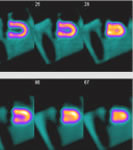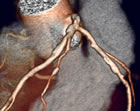| << To Blog Home >> | |
|
|
July 29, 2009 -- 10:30pm PDT Is Radioactive Isotope Shortage an Opportunity
for CT Scans to Shine? Because of the two-part test and the various injections of technetium, etc., the test takes several hours to complete. The patient is also exposed to radiation. If the test is negative, the cardiologist assumes that there is no coronary artery disease (CAD), although there are definitely situations where false negatives can occur. If the blood flow to the patient's heart shows a deficit, then CAD is a prime suspect and the patient is usually sent to the cardiac catheterization lab for a diagnostic invasive angiogram and possible intervention (angioplasty or stent). The accuracy of the nuclear test is good, but 37% of patients sent for diagnostic angiograms show no disease -- indicative of a fairly high rate of false positives for the nuclear screening test, especially in women. Enter the Cardiac Computed Tomography Angiogram (CCTA).
Many in the imaging establishment have been using nuclear stress exams for many years, and the newer, more accurate CCTA has been fighting an uphill battle. But now, as reported in the New York Times, reactors in Canada and The Netherlands that produce technetium have shut down, for a while anyway, resulting in an emergency shortage of the isotope. The gravity of the situation is conveyed by Dr. Michael M. Graham, president of the Society of Nuclear Medicine -- “This is a huge hit,” he proclaimed to the Times. And Dr. Andrew J. Einstein of Columbia University College of Physicians and Surgeons pointed out that since this isotope is used to determine if a patient has a coronary blockage requiring an angioplasty or stent, those invasive procedures would be performed on some who did not need them. (He doesn't discuss the fact that this same isotope-based test sends many patients needlessly to the cath lab for an invasive angiogram -- a test that results in vascular complications about 3% of the time.) Nowhere in the article is the more accurate alternative test of CCTA mentioned. In fact, Dr. Einstein has been critical of CCTA in the past. Perhaps the shortage of technetium will drive more cardiologists to send patients for this newer test. Perhaps the diagnostic value of CCTA will be recognized as a result of the shortage of technetium. And it will shine...not glow... |
|


 The
standard cardiac test for a symptomatic patient, one experiencing chest
pain, is usually a
The
standard cardiac test for a symptomatic patient, one experiencing chest
pain, is usually a  The test is visual: a direct look at the coronary arteries.
The test does not involves exercise and stress, that in some patients
is difficult. The test takes less than 15 minutes to prep and complete.
And with modern equipment operated by technicians trained in the
latest low-dose protocols, the radiation exposure is less than that
of a nuclear test. And then there is the accuracy: 99% negative predictability
-- if the CCTA show no disease, you have no disease.
The test is visual: a direct look at the coronary arteries.
The test does not involves exercise and stress, that in some patients
is difficult. The test takes less than 15 minutes to prep and complete.
And with modern equipment operated by technicians trained in the
latest low-dose protocols, the radiation exposure is less than that
of a nuclear test. And then there is the accuracy: 99% negative predictability
-- if the CCTA show no disease, you have no disease.